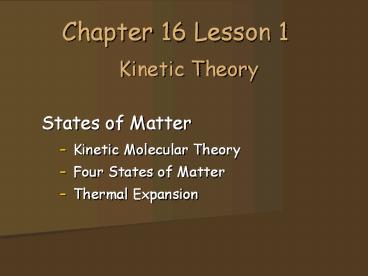Kinetic Theory - PowerPoint PPT Presentation
1 / 19
Title:
Kinetic Theory
Description:
Chapter 16 Lesson 1 Kinetic Theory States of Matter Kinetic Molecular Theory Four States of Matter Thermal Expansion Kinetic Molecular Theory KMT Tiny, constantly ... – PowerPoint PPT presentation
Number of Views:249
Avg rating:3.0/5.0
Title: Kinetic Theory
1
Kinetic Theory
Chapter 16 Lesson 1
- States of Matter
- Kinetic Molecular Theory
- Four States of Matter
- Thermal Expansion
2
Kinetic Molecular Theory
- KMT
- Tiny, constantly moving particles make up all
matter. - The kinetic energy (motion) of these particles
increases as temperature increases. - These particles are colliding with each other and
the walls of their container.
3
(No Transcript)
4
Four States of Matter
- Solids
- low KE - particles vibrate but cant move around
- atoms held tightly into place
- definite shape volume
5
Four States of Matter
- Liquids
- higher KE - particles can move around but are
still close together - indefinite shape
- definite volume
6
Four States of Matter
- Gases
- high KE - particles can separate and move
throughout container - indefinite shape volume
- move more quickly than particles that make up
solids
7
Four States of Matter
- Plasma
- very high KE - particles collide with enough
energy to break into charged particles (/-) - gas-like, indefiniteshape volume
- stars, fluorescentlight bulbs, TV tubes
8
Phase Changes
- Heat of fusion-melting
- solid to liquid.
- energy required to change a substance from the
solid phase to the liquid phase at its melting
point is known as the - some attractive forces are broken
- Freezing
- liquid to solid
- melting point freezing point
9
Phase Changes
- Heat of vaporization
- energy required for the liquid at its boiling
point to become a gas. - all attractive forces are broken
- EX steam burns, sweating, and the drinking bird
10
Heating Curves
- Evaporation
- liquid to gas below the boiling point
- Condensation
- gas to liquid
11
Heating Curves
12
Phase Changes
- Sublimation
- solid to gas
- EX dry ice, freeze drying, iodine
13
Phase Changes
14
Thermal Expansion
- Most matter expands when heated contracts when
cooled. - ? Temp causes ? KE. Particles collide with more
force spread out. - EX thermostats (bimetallic strip)
15
Heating Curves
- Kinetic Energy
- motion of particles
- related to temperature
- Potential Energy
- space between particles
- related to phase changes
16
Solid or a Liquid?
- Amorphous solids and liquid crystals
- two classes of materials dont react as expected
when changing states. - solids soften and gradually turn into a liquid
over a temperature range - lack the highly ordered structure found in
crystals - are typically long, chainlike structures that can
get jumbled and twisted
17
The Strange Behavior of Water
- Water molecules
- unusual in that they have highly positive and
highly negative areas - charged regions affect its behavior
- as the temp drops the particles move closer
together
18
The Strange Behavior of Water
- Freezing water molecules
- unlike charges are attracted to each other and
line up so that only positive and negative zones
are near each other. - water molecules orient themselves according to
charge, empty spaces occur in the structure. - these empty spaces are larger in ice than in
liquid water, so water expands when going from a
liquid to a solid state.
19
Liquid Crystals
- LCD
- flow during the melting phase similar to a
liquid, but they do not lose their ordered
arrangement completely. - placed in classes depending upon the type of
order they maintain when they liquefy - are highly responsive to temperature changes and
electric fields. - ex televisions, watches, clocks, and calculators

